I Ching, Yijing or Zhou Yi
"Oracle of the moon": © 2000 LiSe
 Yi Jing, Oracle of the Moon
Yi Jing, Oracle of the Moon


Answers of the oracle
good and bad fortune, the mandate and the right time
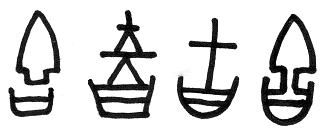 Ji: auspicious (4 versions). The upper part is shi, scholar, the picture is a weapon or a phallus. The weapon looks identical to ancient spear-points, maybe it has something to do with “aquiring metal arrow” (like in hex.21.4). Probably few people had a metal one, it gives chances for good hunting or fighting. The scholar was originally a person trained in a certain field or a soldier. In Japanese, it is the character for 'samurai'.
The lower part is unclear, it is different from 'mouth', maybe a vessel?
Ji: auspicious (4 versions). The upper part is shi, scholar, the picture is a weapon or a phallus. The weapon looks identical to ancient spear-points, maybe it has something to do with “aquiring metal arrow” (like in hex.21.4). Probably few people had a metal one, it gives chances for good hunting or fighting. The scholar was originally a person trained in a certain field or a soldier. In Japanese, it is the character for 'samurai'.
The lower part is unclear, it is different from 'mouth', maybe a vessel?
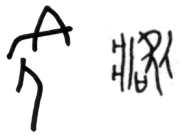 Jiù: fault or mistake (2 versions). Foot above man. The foot is upside down (sui): walk slowly or with difficulty. Wieger: with shackles. The character at right is another old version: man, another (shackled or hindered?) man, a mouth and ? (shackles or old shoes?). Shuo Wen: dragging oneself along, hindered by worn-down shoes. R+K: to differ from what you should be. Do wrong to, inflict calamity; misfortune.
The oracle often says 'avoid faults' (Wilhelm: no blame), Oracle Bones: calamity. "Blame" was in ancient China something a ghost or spirit caused. Making its victim sick, or even causing him to die. See Constance Cook "Death in ancient China", where she mentions it many times: "..unhappy ghosts and spirits that he somehow offended, thus incurring 'blame' jiu.." (p.71)
Jiù: fault or mistake (2 versions). Foot above man. The foot is upside down (sui): walk slowly or with difficulty. Wieger: with shackles. The character at right is another old version: man, another (shackled or hindered?) man, a mouth and ? (shackles or old shoes?). Shuo Wen: dragging oneself along, hindered by worn-down shoes. R+K: to differ from what you should be. Do wrong to, inflict calamity; misfortune.
The oracle often says 'avoid faults' (Wilhelm: no blame), Oracle Bones: calamity. "Blame" was in ancient China something a ghost or spirit caused. Making its victim sick, or even causing him to die. See Constance Cook "Death in ancient China", where she mentions it many times: "..unhappy ghosts and spirits that he somehow offended, thus incurring 'blame' jiu.." (p.71)
 Lin: distress. Wen (language, culture, name of King Wen) with mouth (words, emotions, expressions). The mouth is hindered or acts wrong (without culture?). Meanings: not reckoning with, let go, fail, oppose, stingy, regret, shame, tied to, not able to detach from, hindered.
If it is part of an answer: wrong or distressing emotions are involved. If you change them, then very often harm can be avoided. Not bothering is one of the oldest meanings: not taking care of things means distress is sure.
Lin: distress. Wen (language, culture, name of King Wen) with mouth (words, emotions, expressions). The mouth is hindered or acts wrong (without culture?). Meanings: not reckoning with, let go, fail, oppose, stingy, regret, shame, tied to, not able to detach from, hindered.
If it is part of an answer: wrong or distressing emotions are involved. If you change them, then very often harm can be avoided. Not bothering is one of the oldest meanings: not taking care of things means distress is sure.
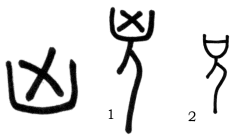
Xiong: pitfall, baleful, terrible. It is exchangeable with 1, praying figure with cross in face or mouth: desperate or unanswered prayer? Meaning also to fear. At right (2): Xiong elder brother: the one who performs the prayers. The meanings are all full of misfortune: inauspicious, ominous, fiendish, ferocious, murderous, terrible, fearful, act of violence, murder, crop failure, famine.
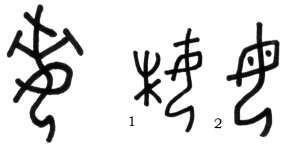
Hui: regret. A woman wearing a feather hair-dress. On oracle bones this graph means měi, covered weather, exchangeable with hui, to regret, and mu, ancestral mother: 1 and 2. Later ‘regret’ is the same character with the radical heart added, but without the hair-dress. Měi: every; each, frequent; often. Wenlin says: the original meaning of mei was 'growing plants', from 'grass' and mu ('mother') as phonetic. "Already from the earliest times applied to a homophonous abstract word: each, every; constantly" --Karlgren. Hui might be ‘many hearts’: many thoughts or decisions, possibilities. It is a name for the upper trigram, where it means regret/counsel. Contrary to zhen (lower trigram) which is only one possible way, the one the gods prescribe. So hui gives also many opportunities to do the wrong thing, many opportunities for regret.
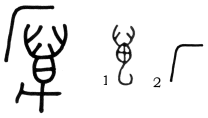 Li: adversity, threatening danger. It is a scorpion (1) under a cliff (2). It is a common term for malicious ghosts, which were often seen as the cause of disaster or disease. Terrible, formidable, persuade, advise, encourage, harsh, severe, serious evil, oppress(ive), cruel, whetstone. Also: 10.000, extreme, very, absolute (not having any alternative). Li is a warning for possible danger. Sometimes 'danger - auspicious': the danger does not necessarily end in disaster, it can be overcome if you pay heed to the warning. Then there is also the value of danger: it leads to experience and circumspection. Not to forget the value of the oracle: warning you before you have to suffer the experience. (see below: more about li)
Li: adversity, threatening danger. It is a scorpion (1) under a cliff (2). It is a common term for malicious ghosts, which were often seen as the cause of disaster or disease. Terrible, formidable, persuade, advise, encourage, harsh, severe, serious evil, oppress(ive), cruel, whetstone. Also: 10.000, extreme, very, absolute (not having any alternative). Li is a warning for possible danger. Sometimes 'danger - auspicious': the danger does not necessarily end in disaster, it can be overcome if you pay heed to the warning. Then there is also the value of danger: it leads to experience and circumspection. Not to forget the value of the oracle: warning you before you have to suffer the experience. (see below: more about li)


 Wu you li Wilhelm translates: 'nothing furthers'. Quite another possibility is 'avoid probing: harvest'. At first sight the meanings are very different, but look at the action one should take: in both cases none, just let things happen, don't try to direct them, or take the known road. The second option is more positive, though. Makes me think of Zen. It occurs in 4.3, 19.3, 25.6, 27.3, 32.1, 34.6, 45.3, 54.0, 54.6, 64.0. In 37.2 it says 'without probing progress' (Wilhelm: she should not follow her whims - ??)
Wu you li Wilhelm translates: 'nothing furthers'. Quite another possibility is 'avoid probing: harvest'. At first sight the meanings are very different, but look at the action one should take: in both cases none, just let things happen, don't try to direct them, or take the known road. The second option is more positive, though. Makes me think of Zen. It occurs in 4.3, 19.3, 25.6, 27.3, 32.1, 34.6, 45.3, 54.0, 54.6, 64.0. In 37.2 it says 'without probing progress' (Wilhelm: she should not follow her whims - ??)
 You you wang Wilhelm: 'undertake something' in hex.2 and 14, 'have somewhere to go' in 36 and 40 and 'if you let it take it's course' in 44. Occurs in 2.0, 14.2, 36.1, 40.0, 44.1. It says 'have probe go': explore events or the best course of action, in order to find out what to do. Moving leisurely, like water flows, probing the flow with a stick.
You you wang Wilhelm: 'undertake something' in hex.2 and 14, 'have somewhere to go' in 36 and 40 and 'if you let it take it's course' in 44. Occurs in 2.0, 14.2, 36.1, 40.0, 44.1. It says 'have probe go': explore events or the best course of action, in order to find out what to do. Moving leisurely, like water flows, probing the flow with a stick.

 Li you you wang In most cases you you wang is preceded by li: harvest or profit. Occasionally, in 3.0 and 33.1, by yong: benefit, use, avail of. Li you you wang occurs in 22.0, 23.0, 24.0, 25.0, 25.2, 26.3, 28.0, 32.0, 41.0, 41.6, 42.0, 43.0, 45.0, 57.0.
Li you you wang In most cases you you wang is preceded by li: harvest or profit. Occasionally, in 3.0 and 33.1, by yong: benefit, use, avail of. Li you you wang occurs in 22.0, 23.0, 24.0, 25.0, 25.2, 26.3, 28.0, 32.0, 41.0, 41.6, 42.0, 43.0, 45.0, 57.0.
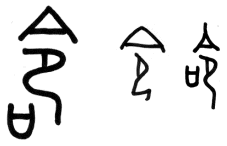 Ming: mandate. A man (often looking rather like a seal) under a big roof, with mouth: giving orders. The seal would be an indication of having received the seal or mandate. On OB it was identical with ling ’fate’, of the pictures the middle one. (Maybe the roof is no roof at all. According to Wang HongYuan: a bell-symbol).
The mandate is Heaven's blessing for your actions. Not only the old kings needed the mandate, every action needs it. If something is done with a bad conscience or fear, against the laws of love or nature, when greed or power is involved, then no blessing is resting on those deeds. Our mandate is our reason for being, our mission in this life, which we can only accomplish if we are true to ourselves.
Ming: mandate. A man (often looking rather like a seal) under a big roof, with mouth: giving orders. The seal would be an indication of having received the seal or mandate. On OB it was identical with ling ’fate’, of the pictures the middle one. (Maybe the roof is no roof at all. According to Wang HongYuan: a bell-symbol).
The mandate is Heaven's blessing for your actions. Not only the old kings needed the mandate, every action needs it. If something is done with a bad conscience or fear, against the laws of love or nature, when greed or power is involved, then no blessing is resting on those deeds. Our mandate is our reason for being, our mission in this life, which we can only accomplish if we are true to ourselves.
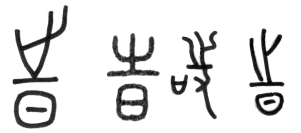 Shi: season, right time, opportunity. A sun or day and sì, a foot-issuing-forth. (Man’s biological clock is every day set right by sunrise!). Si as character has as meaning 'temple', so the right time might also be the time the gods think right.
Shi: season, right time, opportunity. A sun or day and sì, a foot-issuing-forth. (Man’s biological clock is every day set right by sunrise!). Si as character has as meaning 'temple', so the right time might also be the time the gods think right.
Time means especially ‘season’. For farmers, like the Zhou people of King Wen, the most important ‘time’. Every year has its seasons, every day too: morning, midday etc. I don't think the Yi is interested in first - earlier - later - future and such things. If one does something, the ‘season’ is the important thing. Sow when it is the time for sowing, rest when it is the time for rest. Nature does not think about sowing coming before harvest. She sows when it is the right time, she harvests ditto. The Yi tries to make you like nature, living instead of thinking linear. Living is round, in cycles and seasons. Animals do not know ‘today and tomorrow’, they only know ‘now’. To become circular (at least as much as we moderns can) is the big value the Yi can give you. Your intuition is circular (or uses seasons), it is not linear. Linear thinking can solve many problems, but the Yi is especially for the problems one cannot solve in a linear way. It figures only once in the old text, in 54.4, where the late marriage 'has season': is at the right time. The Wings use it in the Tuan Zhuan (image tradition) for many hexagrams.
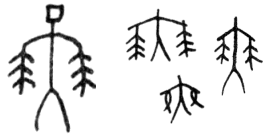 Wu: without, lacking, nothingness, not-have. A person dancing with ox-tails in his/her hands (according to Lindqvist: millet, but there are many photos of shamans dancing with ribbons, feathers or plants). A Wu or shamanka dancing for rain. The meanings are closer to without/in need of, whereas the other wu is closer to without/avoid. This wu occurs only in 3.3, 53.1 and in 'Sequence' 56-57.
Wu: without, lacking, nothingness, not-have. A person dancing with ox-tails in his/her hands (according to Lindqvist: millet, but there are many photos of shamans dancing with ribbons, feathers or plants). A Wu or shamanka dancing for rain. The meanings are closer to without/in need of, whereas the other wu is closer to without/avoid. This wu occurs only in 3.3, 53.1 and in 'Sequence' 56-57.
 Wu: without, avoid. See also wu-lacking. A man exerting himself, pushing away something. 1: man with crippled leg: lame. This way of writing wu occurs innumerable times in the YiJing. I think in many cases 'avoid' is a better translation than 'without' or 'no'. It indicates that faults can be avoided or the omen changed for the better. The YiJing does not predict a fixed future, it just tells you to what future your actions might lead. there is a possibility though that the two characters wu were originally the same picture.
Wu: without, avoid. See also wu-lacking. A man exerting himself, pushing away something. 1: man with crippled leg: lame. This way of writing wu occurs innumerable times in the YiJing. I think in many cases 'avoid' is a better translation than 'without' or 'no'. It indicates that faults can be avoided or the omen changed for the better. The YiJing does not predict a fixed future, it just tells you to what future your actions might lead. there is a possibility though that the two characters wu were originally the same picture.
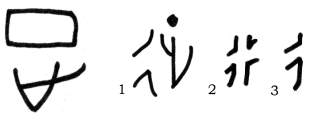 Zheng: chastise. At left the oldest version. A foot going towards a walled city or towards a target. Later ‘road’ (2) was added (only half of the road, 3). If this figures in an answer of the YiJing, it rarely means you have to go and attack a city, nowadays it will mean: go ahead and do what you want or should, or solve this dilemma, attack the problem, gather all your resources and march ahead.
Zheng: chastise. At left the oldest version. A foot going towards a walled city or towards a target. Later ‘road’ (2) was added (only half of the road, 3). If this figures in an answer of the YiJing, it rarely means you have to go and attack a city, nowadays it will mean: go ahead and do what you want or should, or solve this dilemma, attack the problem, gather all your resources and march ahead.
 Fu, truth is usually translated as truth or sincerity. Fu was the act of acquiring war booty, or the booty itself. Later it became a quality: of inspiring confidence, trust, awe or reverence.
Fu, truth is usually translated as truth or sincerity. Fu was the act of acquiring war booty, or the booty itself. Later it became a quality: of inspiring confidence, trust, awe or reverence.
The number of captures or the amount of booty meant that the leader of the army or the king was a trustworthy and reliable leader: a man with fu.

 you fu
you fu
You fu, have truth: to have the blessing of spirits or ancestors or gods. This means one has the sincerity which inspires others to trust.
I Ching with Clarity: ".. almost always, the I Ching shows not only 'good fortune or misfortune' but also the energies and reasons behind it. Often, these will resonate with what you already almost-knew. ... But the I Ching is not primarily about seeing into the future - it's more to do with creating it. About 99% of the time, there is no 'doom' set to descend on you from a great height, but only a trend hidden in the present moment. ... If the I Ching is showing you where the river of events flows to, can you trace it to its source? Usually, the omens (words like 'misfortune' or 'shame') will be surrounded by imagery that shows you the real nature of what is going wrong". (Clarity in 'ANSWERS', her twice-a-month newsletter.)
Harmen Mesker about Li : "Personally I wonder why li 厲 is translated as 'danger' all the time. I mean, there are older meanings, closer to the time when the Yijing is supposed to be written, which are equally valid, or, in my opinion, more valid. One of those meanings is 'to inspire, to excite'. Another is 'arriving at a high place', mainly used for birds. In old texts the phrase 貞厲 could mean something like 'the divination arrives high, is received by the ancestors' (just speculating). 厲 also means 'strict, stern', as in Lunyu VII.38. The general meaning that I sense in this character is that of ability, have the power or strength to achieve something. 貞厲 could therefore mean 'the divination is powerful, has result'."